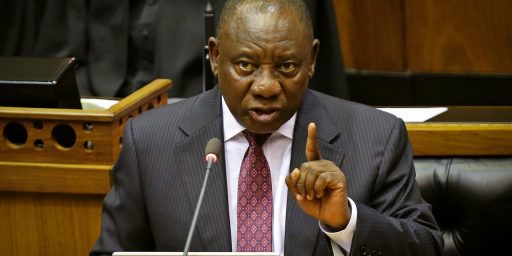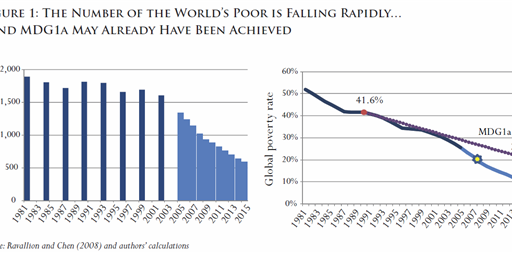Ending World Wide Poverty
By severe poverty we mean here the conditions experienced by those who live on less than $1 per day. There are quite a lot of people like that on the earth, and I think it should be clear that if we really do have a workable plan on the table to eliminate severe poverty around the world for $150 billion per year that we probably ought to pony up the $150 billion. Indeed, we probably ought to pony up something like $200 billion to give ourselves some margin of error.–link
Bwahahahahaha.
The reason why I find the above funny (in a morbid way) is this idea that we can wipe out poverty by simply flinging cash at it. The problems with poverty are not simply a shortage of cash.
For example, Africa is a complete basket case in terms of poverty and economic progress. A part of the problem is a lack of the institutions that have helped make the West prosperous. Are we willing to smash into oblivion (or at least send packing to museums) the various aspects of African culture that prevent the adoption of things like property rights, the rule of law, wide spread educational reforms (i.e., educate both men and women) and so forth? If we aren’t willing to do this the idea of ending poverty for the bargain basement price of $150 billion or even $200 billion is just fantasy.
As I noted here we should be striving to export capitalism–i.e. market economies– and the institutions that allow market economies to work to generate wealth not just for the rulers, but for everybody.
Now this isn’t the only problem, but it is part of the problem and ignoring it will mean not ending poverty, but creating dependency and paternalism. Also, I don’t dispute that colonialism is still a factor in the problems of Africa in terms of the almost continuous warfare that seems to plague the continent. But flinging cash at this problem is the idiot’s solution.
Another problem with this whole idea is the idea of using the U.N. After the recent debacles in Africa and the Oil for Food Program, the U.N. at the very least needs a major over haul if it is not already irrelevant. I would think that if one is serious about making the U.N. a credible force in international politics a good starting point would be the firing of Kofi Anan. While he may not have been personally involved in the Oil for Food Program it was a disaster that occurred on his watch and he should be sent packing.
Turning again to Yglesias’ post we see a couple of gems in there that highlight the nonsensical nature of his position. I’m going to quote at length to reduce the risk of quoting out of context,
Dan says that “What I’m still undecided about is whether the investment is worth it even if Sachs is only, say, 50% correct. Would there be any other way of spending $150 billion a year that reduced extreme poverty by more than that amount?” These are both worthwhile questions, but they’re actually different questions, and I don’t think Dan should run them together. Obviously, continuing to do research on whether we can’t come up with better ideas is something we should do. And if seemingly better ideas get put on the table, we ought to take them.
Nevertheless, a proposal that promises to cut extreme poverty to zero and that may, in fact, “merely” reduce it in half is a proposal that’s well-worth supporting on its own terms. I could say something about the perfect being the enemy of the good here. I don’t see any other similarly elaborate proposals on the table, nor would it be easy to generate the political will necessary to implement any plan on this scale, so it seems to me that it would be a good idea for people to put their support behind this idea and do what they can to get it implemented. If something better comes along down the road, then so much the better. Is the Sachs Plan worth doing even if it’s “only” 50 percent right? Sure. If we had a plan on the table to eliminate global poverty for $300 billion a year, that would be worth doing. Instead, we have a plan to do it for $150 billion a year that may not actually achieve 100 percent of its goals. A huge number of people (including Dan) have supported the proposition that one ought to support an undertaking in Iraq that, when all the bills are done, will have cost the United States far more than $150 billion for essentially humanitarian reasons. And a commitment by the broader community of rich countries to pony up $150 billion in anti-poverty spending per year would require considerably less than $150 billion per year from the United States.
The unstated premise here is that there is an unlimited well of money that can be tossed at this problem. If $150 billion could get rid of world wide poverty, then lets make it $200 billion. Further, even if it costs only $300 billion to reduce world wide poverty by 50% then great! Lets do it and who cares what else we could have spent the money on. The last one is really insensate. Lets consider the case where the estimated cost of reducing world wide poverty to zero is $150 billion. Matthew suggests that we should tack on an additional $50 billion in “Just In Case Money”. But what else could that money be spent on? A cure for HIV/AIDS, a cure of alzheimers, or alternative energy? One could argue, in a rather lame brained fashion, that we can’t gaurantee success in finding cure for HIV/AIDS, alzheimers, or a solution for alternative forms of energy. But this very same criticism applies to reducing world wide poverty. We don’t know what the chances of success of spending this $150 billion or $200 billion. And we’ll just ignore that throwing in an additionaly $50 billion of “Just In Case” money is likely to lead to waste, fraud and abuse. After all, we are pretty sure we can do it with $150 billion, so who’ll miss a billion here a few hundred million there.
In reading the post and the linked article it is a bad joke. There is no discussion of the problems with incentives. For example, if you raise these people out of abject poverty what if they increase their number of children? Does this run the risk of increasing the number of people on the brink of extreme poverty were a change in the political situation can send even more people into misery? How do we ensure that we spend $150 billion and end extreme poverty and not end up spending $1.5 trillion over the next 8 to 10 years with even larger expenditures over the next 20 to 30 years? How come there is no discussion of introducing and strengthening the very institutions that have helped make the West so successful? The best part is when Matthew is coming up with “fair” amounts each country should pay. Sure thing Matt, where should we send the check?






Even acknowledging the truth of what Steve says, I still ask: What’s the alternative? Buying ourselves HDTV’s while kids starve?
I wish the focus were on “finding a realistic way to combat world poverty” instead of “shooting down any project for combatting world poverty.” Sure, it’s unrealistic. So was the A-bomb.
I heard an NPR report on this last week. The story included some of the objections you raise. Apparently, this is Sach’s “weekend” of coverage for his poverty initiative.
Anderson,
I agree that such a response is cold-hearted and more than just a bit scary, and I’m not advancing such a view. What I am saying is that Sach’s solution may not be much of a solution and it sure would suck if we threw $150 billion down toilet when we could have spent the money on something else and/or spent it more wisely.
The more I read of Sach’s position, the less impressed I am. It really does seem to be throwing cash at the problem as I outline here.
Thanks for the clarification, Steve. I strongly suspect that something useful could be done with $150B in at least some African countries; Drezner’s blog has some thoughts compatible with yours. But given the need for stable governments, things may get worse before they get better.
Your position, then, is that if $150 million can resuce poverty by 50%, we shouldn’t do it.
I see.
jpe, I’d suggest removing your head before constipation sets in.
My position is that we don’t even know if the $150 billion will reduce poverty by 10%, 25% let alone 50% or the 100% that is being claimed (not to mention the $50 billion of “just in case” money). Further prior to spening all of the money we could spend it on something else, and once it is spent on poverty reduction it can’t be spent on something else. You know, that annoying concept called opportunity costs.
Or if that was too abstract for you let me put it this way.
1. We have a finite amount of resources.
2. We have a great many things this money can be spent on (such as research for cures for diseases, environmental issues, so forth).
3. If we spend the money on a given project it can’t be spent on another.
4. Lets at least be pretty damn sure we are going to get something good out of this kind of expenditure.
Anderson,
Yeah I read it, and linked to it in my post on my blog. I’ve read some of Sach’s research on this, and I’m not terribly impressed. It isn’t horrible, but I’m not sure it justifies the kind of spending he is claiming. Maybe it does, but I’m not convinced yet.
Just tossng money at a problem without a plan, is throwing your money down the drain.
Also, in regards to Africa at least, part of the problem is the governments themselves. Give 150billion to some poor African nation is more than likely oging to enrich the thug who runs the government than actually help those who are most in need.
The politics in the poor nations have got to improve, if poverty is going to improve.